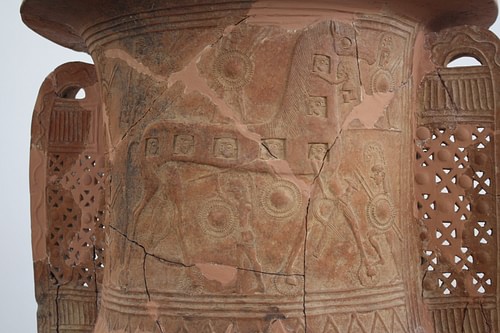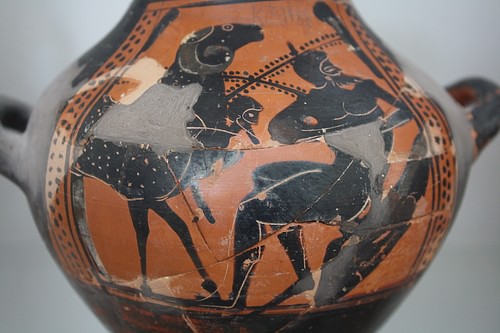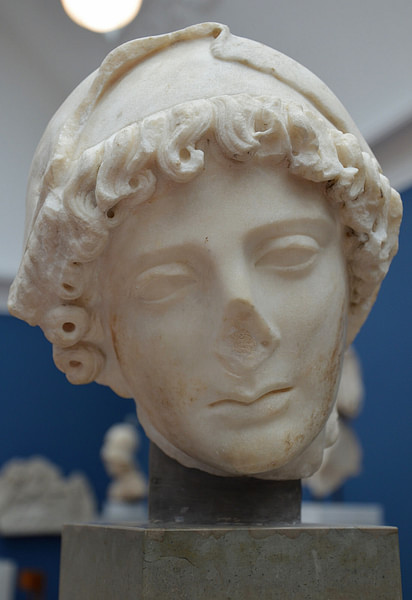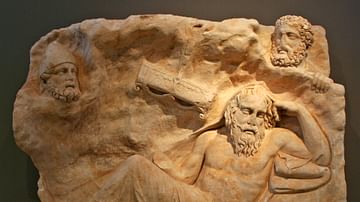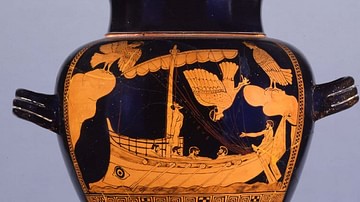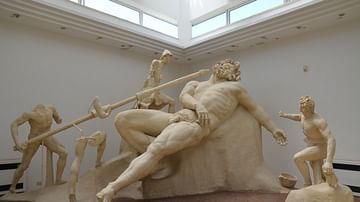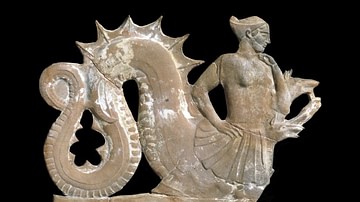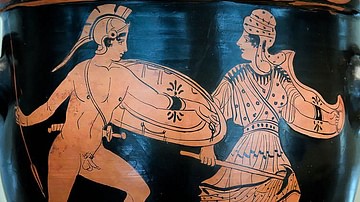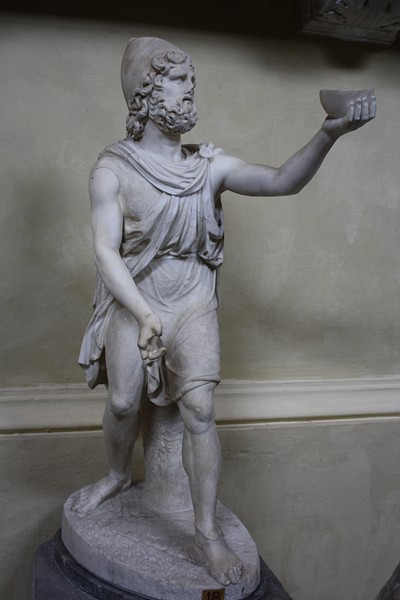
Odysseus (Roman name: Ulysses) was one of the great pan-Hellenic heroes of Greek mythology. He was famous for his courage, intelligence, and leadership. Odysseus' resourcefulness and oratory skills were instrumental in the Greek victory in the Trojan War. After that conflict, Odysseus was the protagonist in many fantastic adventures on his Odyssey, the long voyage back home to Ithaca.
In Greek mythology, Odysseus was the son of Laertes and Antikleia (or Anticlea) and the King of Ithaca, leader of the Kephallenians. Married to Penelope, he also had a son, Telemachos (or Telemachus). The hero was also fortunate enough to regularly receive the special aid and protection of the goddess Athena. Hesiod describes Odysseus as “patient-minded”, and Homer most often describes him as “godlike”, also as “Zeus' equal in his mind's resource” and a truly great speaker, whose persuasive words “flocked down like snowflakes in winter”. However, the hero was not just a thinker but also a warrior, and his courage and fighting prowess are referenced in the Homeric epithet “sacker of cities”. Homer also states that the name Odysseus means “victim of enmity”, no doubt in reference to the ill-feeling which Poseidon directed against the hero.
Odysseus Prepares for the Trojan War
The first rich source of information on Odysseus was Homer's account of the Trojan War in the Iliad in which our hero is a protagonist. Odysseus was involved in several important episodes and his intelligence, wise counsel, and wits proved crucial to the eventual Greek success in the war.
However, Odysseus very nearly avoided the conflict altogether for when he was called upon by Palamedes (an emissary of Menelaos), the King of Ithaca was loathe to leave his wife and family and so pretended to be insane. This he convincingly did by ploughing a field with an ox and an ass yoked together and scattering salt in the furrows. Palamedes was not to be tricked though and by laying the young Telemachos in the path of the plough, Odysseus was forced to swerve and so demonstrate he was not so mad after all.
It was Odysseus who persuaded the reluctant Achilles to join the Greek expedition to Troy. Hidden away by his mother Thetis (who knew his fate should he participate in the War), Achilles was brought up by the royal family of Lykomedes on the island of Skyros. However, Nestor, the wise king of Pylos, predicted that only with the help of the great warrior Achilles could the Greeks hope to conquer the great walled city of Troy.
Accordingly, the wily Odysseus was sent to persuade the greatest fighter in Greece to leave his wife and son and fight alongside the forces led by King Agamemnon. Disguised as a rich salesman, the King of Ithaca tempted Achilles to drop his disguise as one of the daughters of Skyros and reveal his true identity by presenting an assortment of fine weapons for which the great warrior was unable to hide his interest. With Achilles also came his formidable private army, the Myrmidons of Thessaly.
Odysseus was once again chosen as envoy in order to persuade Agamemnon's daughter Iphigeneia to join the Greek forces at Aulis. Whilst hunting, Agamemnon mistakenly killed a deer sacred to Artemis and according to the seer Kalchas, only the sacrifice of the king's daughter would appease the goddess and allow the Greeks safe voyage to Troy. Odysseus then travelled to Mycenae and promised Iphigeneia's mother Klytaimestra that the girl could marry Achilles. Pleased at the prospect of such a prestigious son-in-law, the queen readily agreed. When arriving at Aulis, however, preparations had already been made for the sacrifice and the poor girl was immediately set upon an altar. Fortunately though, just as Agamemnon let fall his sword, Artemis took pity on the girl, replaced her with a deer, and spirited off Iphigeneia to become a priestess at Tauris in one of the goddess' sanctuaries.
The Greeks duly received fair winds and landed at Troy. Apart from a minor incident where Odysseus and Diomedes ambushed the youth Dolon in a forest, Odysseus had little to do until the final stages of the war. Following the death of Achilles, there was something of a squabble over who should inherit the hero's magnificent armour. Odysseus and Telamonian Ajax both forwarded claims but the matter was finally decided in a vote and with Athena influencing proceedings, Odysseus was given the weapons and armour made by Hephaistos.
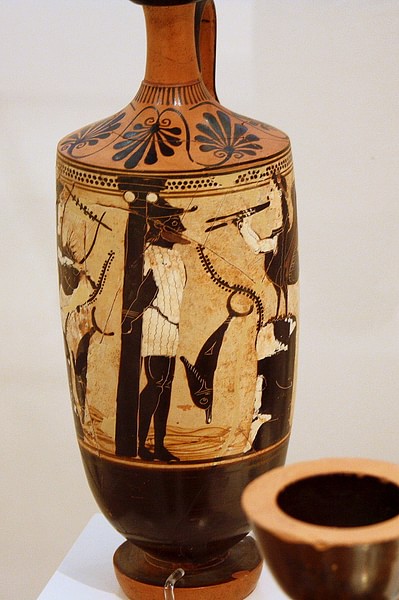
Odysseus' Role in Greek Victory
Notwithstanding the loss of their talismanic warrior, the war ran on, but at this point the Greeks began to employ a little more strategic thinking to the problem of overcoming the walls of Troy. The seer Kalchas predicted victory only if the Greeks could somehow ensure three things. These were: the involvement of Achilles' son Neoptolemos in the war; Hercules' fabled weapons, then in the hands of Philoktetes (or Philoctetes), had to be used; and finally, the Greeks had to capture the Palladion. The latter was a sacred wooden statue of Athena which was believed to have fallen from heaven and been found by Troas, the founder of Troy. The Trojans believed that this statue gave them protection and power so that by stealing it the Greeks would gain a great advantage in the war.
Odysseus was the man to accomplish all three of these difficult tasks. First, he went back to Syros and persuaded Neoptolemos to join him. Then he went to Lemnos to pick up Philoktetes and the weapons of Hercules. The latter was, though, more than a little peeved at having been abandoned on the island in the first place, but it turned out to be worth all the persuasive efforts of Odysseus, as Philoktetes managed to kill Paris with his deadly arrows pretty much as soon as he entered the battle at Troy.
This left task three to be accomplished - to take the sacred Palladion from the heart of the city. To find the exact location of the statue, Odysseus disguised himself as a beggar and entered the city undetected. One person did recognise the infiltrator though, and that was Helen, by now forcibly remarried to another of Priam's sons and anxious to return to Greece. It was she who guided Odysseus to the location of the Palladion. Returning to the Greek camp with this knowledge, Odysseus enlisted the help of Diomedes and the next night, the pair once more stole into the city and made off with the statue.
Despite the theft of the Palladion, the war rumbled on and it became clear a more ambitious strategy was required if the Greeks were ever going to win the conflict. With divine inspiration from Athena, Odysseus came up with the brilliant idea of the wooden horse. He had carpenters build a huge horse in which could hide a number of Greek soldiers. The trick was how to persuade the Trojans to take the horse inside the city walls. Odysseus first had all of the Greeks abandon their camp and sail away out of view, anchoring off the island of Tenedos. This left only the horse standing alone on the plain with one man left behind, Sinon. He pretended to have been hunted by the Greeks as an enemy and potential sacrificial victim. Gaining their confidence, he then proceeded to tell the gullible Trojans a cock and bull story about Athena being outraged at the theft of her statue, her punishing the Greeks and telling them the only way back into her good books was to build a gigantic wooden horse in her honour and sail back home. Falling hook, line, and sinker for the story, the Trojans duly dragged the horse into the city to stand outside the temple of Athena. With the exception of Laokoon and Aeneas, the Trojans then set about partying the night away in celebration of finally winning the war.
When the party finally ended and the Trojans were sleeping in a drunken stupor, Sinon fired a signal to the waiting Greek ships and they promptly returned to the shores of Troy. Odysseus and his fellow Greek warriors then descended from within the horse, opened the city gates, and the Greek army routed the Trojans, defiling temples and mercilessly slaughtering all and sundry.
The Odyssey
One unfortunate consequence of the Greek's ungallant behaviour at Troy was that the gods punished them by ensuring many of their ships met with disaster on the return voyage home. One of the few survivors was Odysseus but only after an incredibly protracted voyage of detours and misadventures which are recounted in Homer's Odyssey.

Lasting ten years, on his odyssey home the hero stopped in many ports, few of which were friendly. The first stop was the island of Kikones where amongst other things, the god Apollo gave the hero twelve flasks of wine. Then, hit by a storm, Odysseus and his flotilla were washed up on the shores of the Lotus Eaters. Eating the plant made one forget one's homeland so the hero turned down their offer of hospitality and quickly pushed on with his voyage.
Next stop was the island of the Cyclopes - the one-eyed giants - who lived peacefully tending their sheep. As luck would have it, though, Odysseus bumped into the man-eating Cyclops Polyphemos, the son of Poseidon, god of the sea. The giant took a fancy to the travelling Greeks and trapped them in his cave, swiftly eating two as an appetizer. Seeing the gravity of the situation, Odysseus immediately forged a cunning plan of escape. Tempting Polyphemos with wine until the Cyclops was drunk, the hero ordered his men to turn Polyphemos' olive-wood staff into a spike, this they then hardened in a fire and used to blind the Cyclops while he slept. Unable to see and understandably livid at his treatment, Polyphemos tried to catch the travelling Greeks by feeling his sheep as they left the cave for their grazing. Odysseus then instructed his men to tie themselves to the bellies of the sheep whilst he chose a ram for the purpose, and thus they escaped to continue their voyage. However, the Cyclops cursed Odysseus, predicting the loss of his men, a wearisome voyage home, and disaster when he finally arrived there. Calling on the help of his father Poseidon, Polyphemos ensured that it would be many a storm and ten long years before Odysseus reached Ithaca.
Further adventures followed. Amongst them was a stop in Aiolia (or Aeolia) where the god of the winds, Aiolos (or Aeolus), gave Odysseus a flask which contained all the winds except the one which would take him home but, unfortunately, some members of Odysseus' crew allowed curiosity to get the better of them and, within sight of Ithaca, they opened the bottle. As a result, the contrary winds escaped and Odysseus' storm-tossed ships were swept all the way back to Aiolia.
Resuming the voyage once again, more unfortunate stopovers occurred in Laistrygonia where the gigantic locals, led by Antiphates, attacked and killed many of the party by pelting them with huge rocks.
Odysseus & Circe
The few survivors then made it in a single ship to Aiaia (or Aeaea), an island belonging to the sorceress Circe (or Kirke), where more trouble awaited the beleaguered voyagers. The goddess turned a group of the travellers into swine and Odysseus was only able to resolve the situation with a gift from Hermes. The messenger god gave the hero moly, a plant which made him immune to Circe's spells. However, the two got on rather well and became lovers, resulting in Odysseus extending his sojourn to a whole year. Eventually, resolving to continue his journey home, Odysseus was advised by Circe to visit the underworld and seek the advice of the Theban seer Teiresias who would give him travel directions.
On his journey there, the hero met his mother, Antikleia, who had died from grief at her son's continued absence. He also met many fallen heroes such as Hercules, Achilles, and Agamemnon. On returning to the world of the living, Circe gave Odysseus one final piece of advice. This was to beware of the Sirens - bird creatures with women's heads - who ensnared passers-by with their beautiful and enchanting singing. Accordingly, when the hero's ship passed the Siren's island, he instructed his crew to block their ears with wax whilst he himself was strapped to the ship's mast so that he might hear the divine singing yet not be entrapped by it.
Successfully getting past the Sirens, the hero and his few remaining crew then had to negotiate the terrible seas between two rocks inhabited by the monsters Skylla (who had twelve feet, six heads and ate mariners for fun) and Charybdis (who swallowed the seas three times and spat them out three times to create fearsome whirlpools). Six more of the crew were lost here but the ship survived to continue its voyage home.
Odysseus & Calypso
A brief stop at Thrinikia (or Thrinacie) turned into a month-long stay due to bad weather and the Greeks ran out of food. Despite the earlier advice of Teiresias not to touch the herds of Helios, some of the starving crew, led by Eurylochus, slaughtered several of the animals for food. Outraged, Helios caused the ship to capsize when it left Thrinikia and the only survivor of the disaster was Odysseus, who, after nine days adrift, washed up on the shores of Ogygia.
Here the hero spent five years imprisoned by, but also enjoying the charms of, the Nymph Calypso and with her having a son, Nausithous. However, credit to our hero, despite the offer of immortality and eternal youth, Odysseus decided he must try once more to return to his homeland. Calypso, prompted by divine intervention, helped the hero build a raft on which he set off for Ithaca once more. Poseidon, however, once more spitefully intervened and caused a fearful storm to smash the raft to pieces. Odysseus then washed up battered and naked on the island of Scheria, home of the Phaeacians, straight into the sympathetic care of Nausikaa, the daughter of King Alkinoos (or Alcinous). Restored to full health and vigour, the hero was given one of the magic Phaiacian ships which needed no captain to steer. With this vessel Odysseus finally made it back to Ithaca. However, just as Polyphemos had promised, all was not well in the king's palace.
Odysseus Returns to Ithaca
After ten years away, Odysseus had been all but forgotten, only his wife Penelope kept faith with the long-missed king. Athena gave the hero an update on all that had passed in his absence. Considered long-dead, many a suitor sought the hand of Penelope and the would-be kings (all 108 of them) had taken residence in the palace itself. Penelope constantly put off a decision of re-marriage though and hoped against hope that her husband was still alive somewhere.
Consequently, to push the situation to a crisis, the suitors planned to kill her son Telemachos at the soonest opportunity. On the advice of Athena, and exercising his famously nimble wits, Odysseus dressed as a beggar and visited the palace in person to assess the situation. Only Odysseus' old maid Eurykleia recognised the hero (from a distinctive scar on his leg) and so too his faithful old dog, Argos, knew his old master but rather tragically died as soon as the two were reunited. Revealing himself to his son Telemachos (just back from Pylos), Odysseus planned a strategy to free the palace of all the hangers-on and reclaim his rightful authority. The hero, still in his beggar disguise, was badly treated by the palace suitors and was the butt of many a cruel jest but revenge was soon to be had.
Penelope challenged the suitors that if one of them could string the huge bow that had belonged to the old king and then shoot an arrow through twelve axe-heads, she would marry him. Of course, none of the hapless suitors had the necessary strength to string the bow, never mind shoot with it. Then, up stepped the beggar and to a chorus of sceptical jeers, unbelievably, strung the bow with ease and fired an arrow dead-straight through the axe-heads. Flinging off his disguise, Odysseus revealed his true identity and spread panic amongst the suitors. There was to be no escape for the interlopers, though, because, as planned, Telemachos had closed all the doors and removed the weapons mounted on the walls. Odysseus then casually picked off the suitors one by one with his fearsome bow and so reclaimed his long-abandoned kingdom.
The royal couple, together again after ten long years of separation, lived happily ever after, or not quite. For in a tragic final twist, an aged Odysseus was killed by Telegonos, his son by Circe, when he landed on Ithaca and in battle, unknowingly killed his own father.
How is Odysseus Represented in Art?
Odysseus is a popular subject in ancient Greek art, appearing on vases, coins, sculpture, tripods, and shield bands from all over Greece and he is often identified by his pilos - a conical felt hat. Scenes on red- and black-figure pottery from the 7th to the 5th century BCE depicting Odysseus include the mission to Achilles, the quarrel with Ajax over the armour of Achilles, the theft of the Palladion, blinding the Cyclops, washing up on the shores of Scheria, and taking revenge on Penelope's suitors.
The subject of the wooden horse is surprisingly uncommon in Greek art but it is famously represented on a clay relief pithos from Mykonos c. 670 BCE. A celebrated representation of Odysseus and the Sirens is found on an Attic red-figure stamnos from Vulci c. 450 BCE.
